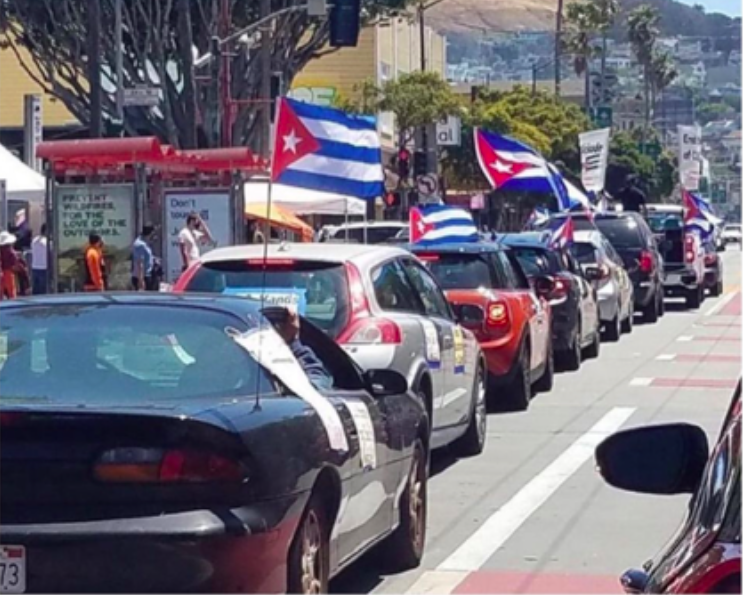On Wednesday, June 23, the U.N. General Assembly voted on a resolution condemning the United States’ economic, commercial, and financial embargo (or blockade) of Cuba. The resolution passed overwhelmingly – 184 to 2 – with only the US and Israel voting against. This is the 29th time since 1992 that nearly all countries voted to condemn the policy and declare it illegal under international law. Only in one year, 2016, did the Obama administration abstain from voting, reflecting what has been called “the Obama thaw” of improved relations with the island nation.

To punish Cuba soon after its revolution, the US imposed the embargo in 1960. Under the Trump administration, despite the global pandemic, the blockade was tightened even further. Trump imposed 243 new measures, leading to painful shortages of food, fuel, and some medications.
With the US threatening major fines and prison sentences, suddenly shipping companies were no longer willing to deliver ventilators that had been donated to Cuba for critically ill COVID patients, and the government had great difficulty obtaining 37 ingredients needed for the country’s production of COVID vaccines.
Although during the presidential campaign the Democratic Party platform promised to review Cuba policy, administration officials callously said that “Cuba is not a priority foreign policy issue,” and Biden is still following Trump’s executive orders.
While the UN vote was an international event occurring in New York City, people in the Bay Area and around the world protested the continuation of the 71-year-old policy. Earlier this year, young Cuban Americans in Miami put out a call for protest caravans, and by June 20 the movement had spread to over 70 cities across the US, Canada, Africa, Asia, Europe, and Australia.
In San Francisco, more than 30 vehicles and 50 people participated in a car caravan organized by the ANSWER Coalition and the Bay Area Venceremos Brigade. Cuban flags flying, the caravan snaked through the Mission and other neighborhoods with cars decorated with protest signs such as “Cuba Yes, Blockade No” and “Return Guantanamo to Cuba.”
A chant leader called on residents to raise their fist and honk their horns if they opposed this cruel and illegal policy. Many people in cafes, on sidewalks, and in cars responded in kind.
Then, during June 22-23, Bay area residents among hundreds of others from around the world also participated in a 24-hour virtual picket, organized by the Canadian Network of Cuba and the US-based National Network on Cuba, speaking out against US Cuba policies and celebrating the UN vote as the tallies were projected.
Speakers at the car caravan rally and during the 24-hour virtual picket decried the hypocrisy of the U.S. placing Cuba on its list of states not “cooperating fully” with US efforts to fight terrorism. Additionally, they praised Cuba’s Henry Reeves Brigade for its international solidarity medical brigades that has helped dozens of countries combat the pandemic.
The speakers at these events also reported that, despite the tightening of the embargo, Cuba’s government biotech industry has developed five vaccines against COVID, two of which have succeeded in phase-three clinical trials and one recently recording 92 percent efficacy. However, the embargo hampers Cuba’s ability to purchase syringes to administer the shots for all Cubans.
Thus, the Saving Lives Campaign has launched a “Syringes for Cuba” initiative to send syringes to the island nation. The group has already raised more than $400,000, with a final push now underway to get to six million syringes.
Addressing the General Assembly before the June 23 vote on the resolution, Cuba’s Foreign Minister Bruno Rodríguez expressed that in the context of COVID pandemic, “the US administration took on the virus as an ally in its merciless non-conventional war … [stepping] up the economic, commercial and financial blockade.” He called out the “243 unilateral coercive measures to restrict the visit of US travelers …; adopted wartime measures to deprive us from fuel supplies; hounded the health services we provide in many countries; … [sought] to intimidate foreign investors and commercial entities with the application of Title III of the Helms-Burton Act; … [and] prevented regular and institutional flow of remittances to Cuban families.”
Rodríguez also explained that “from April 2019 to December 2020, the damages caused by the blockade amounted to over $9.1 billion at current prices …. At current prices, the accumulated damages in six decades amount to over $147.8 billion …”
Representatives of other countries spoke out at the UN General Assembly about what some called “an extraterritorial economic war,” noting how companies based in their countries were being fined or otherwise penalized by the US for engaging in trade or other business relations with Cuba.
The US diplomat, Rodney Hunter, who addressed the General Assembly attempted to justify the Biden Administration’s vote against the resolution, stating that the sanctions against Cuba were a “legitimate tool” in achieving its foreign policy objectives and to support the Cuban people.
How much longer will the US continue to isolate itself and turn a deaf ear to the international community, which overwhelmingly condemns the U.S. blockade of Cuba?
The Bay Area Saving Lives Committee can be reached at bayareasavinglives@gmail.com.




